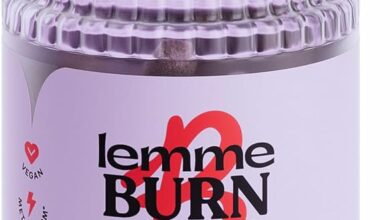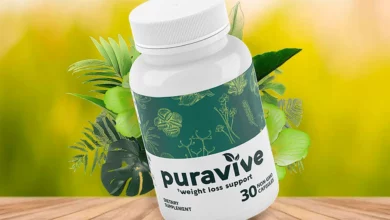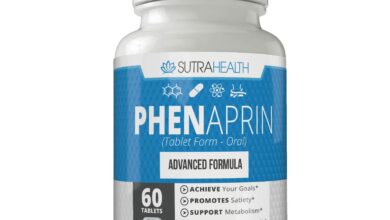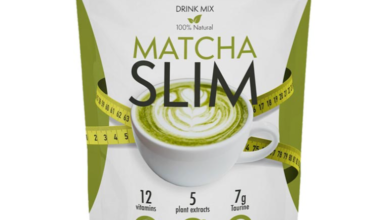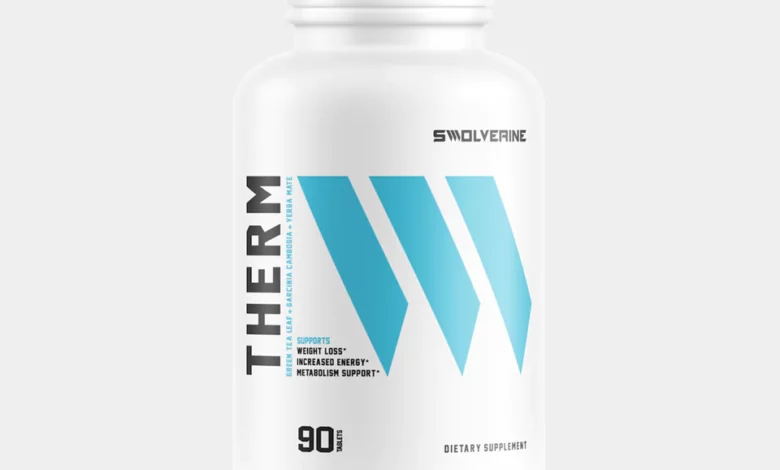
Swolverine Therm Reviews
Does Swolverine actually help decrease body fat?
First of all let’s just give credit for what is without a doubt the best brand name we’ve ever seen. It’s the kind of thing you can imagine everyone said no to, because it’s just so stupid, but it’s extremely charming because of that. Unfortunately that’s about where the compliments end, as Therm is a pretty terrible supplement for reducing body weight.
Ofcourse we’ll go into more detail, but it almost comes across as though it’s throwing everything at the wall and hoping something sticks, with 20 ingredients in total. It’s either that or perhaps they’re hoping that by providing so many ingredients, they’ll attract less knowledgable customers who think more is better. We can’t say for sure, all we can truly say is that we do not recommend this product at all, and would advise you go elsewhere for your weight loss needs.
With a name like swolverine it seems their main target demographic would be regulars at the gym, so if you’re looking for something that can help you lose weight and supports your fitness journey, then we highly recommend Instant Knockout Cut instead. It was developed alongside MMA coaches as a way to help the fighters meet weigh-in goals without sacrificing strength, and it’s so effective it’s still used to do this day. It has a much more focused ingredients list that hits every aspect of weight loss, from reducing sugar cravings to improving metabolism and everything in between.
With that said let’s get into the review proper and see exactly where this fat burning supplement fails.
Shop Instant Knockout Cut Deals Here
Ingredients Breakdown
Vitamin B6 – 25mg
B vitamins are a common ingredient in many weight loss supplements, as they’re characterised by the roles they play in all aspects metabolism. Vitamin B6 actually plays a role in over 100 enzyme reactions [1], and has been studied for it’s potential links to obesity. It’s been proven to have some links as many studies have found supplementation to help, such as one study we found in which the researchers concluded as such: “Vitamin B6 supplementation may be effective at improving body composition and biochemical factors associated with obesity [2].
Overall a strong start, though noting the dosage here is actually very high. This won’t cause problems but looking at it as a formula, it’s space that could be better used elsewhere. As we’ll soon see, the dosing is all over the place with Swolverine Therm.
Iodine – 150mcg
Iodine is often discussed in some corners on the internet as something that can supposedly improve the body’s metabolic process/ promotes a healthy metabolism. You can see some logic here as Iodine is an essential trace element involved in thyroid health, but the reality is that the data does not support these claims. There are some promising results here and there, but overall the data is still very inconclusive. This can be seen in this review we found which tested data on urinary iodine to see if there was a link with the levels and obesity. In the conclusion of the paper the researchers say: “data on UI excretion in overweight/obese children are divergent, as both increased and reduced UI levels are reported in overweight/obese children compared to normal-weight controls”. [3]
Chromium – 100mcg
This is a very interesting essential trace mineral with a rather tragic recent history. Basically we get Chromium from most food sources, but it’s been in decline in recent years due to modern agricultural practices, and this deficiency has strong links to obesity. The data is conflicting however, as this review we found states: “The effects of Chromium on body composition are controversial but are supported by animal studies” [4].
Unfortunately whether helpful or not, 100mcg isn’t going to do a whole lot.
Guarana (33% extract providing 100mg Caffeine) – 300mg
Probably the most effective ingredient in this entire formula, as it’s one of the few that are not only clinically proven to help decrease body fat but is actually dosed effectively. Essentially caffeine is very helpful for people looking to increase lean body mass, with three powerful effects; suppress energy intake/ suppress appetite [5], increasing basal metabolic rate [6], and increasing workout intensity [7].
The dosage her is effective as we said, though is definitely on the lower end of the spectrum still. That said, we’ll take it as a win as it’s likely the last bit of positivity for a while.
Cocoa Extract – 50mg
It might sound too good to be true that cocoa could help with obesity, and although there’s some support evidence, the data is ultimately still inconclusive so it likely is. We found a review that took 19 clinical trials and analysed their data, and they concluded as such: “more studies are needed to investigate the impact of cocoa polyphenol intake on obese adults, as the results of the included studies are still inconclusive” [8]
Yerba Mate Powder – 50mg
This is an interesting ingredient to see in a weight loss supplement as it’s actually fairly positively received when looking at the clinical data. The reason you don’t tend to see it in many weight loss supplement however, is that it requires a very large amount of space in the supplement for what is ultimately a fairly fine effect that could easily be replicated with half the amount of something like L-Theanine and EGCG from green tea. This can be see in this study we found that had very promising results, supplementing 3150mg of yerba mate powder [9]
Green Tea Leaf – 50mg
A sight for sore eyes here is one of the most well recognised and positively received ingredients for weight loss. We all know someone who drinks green tea and swears by it, and it’s had a lost of positive results in clinical testing. The extract here is EGCG, the most abundant flavinoid present in green tea. With fear of repeating ourselves, it’s the low dosage that is the issue. This fantastic review shows positive results being observed from a dosage of 500mg plus [10], a whopping ten times more than is present in Therm.
Garcinia Cambogia Leaf – 125mg
This ingredient rose in popularity about 15 years ago due to promising animal testing, but once human intervention studies were conducted most people moved on and forgot about it. We found a systematic review of human intervention studies so we’ll let them sum it up for us: “The evidence from RCTs suggest the Garcinia extracts generate weight loss on the short term. However, the magnitude of this effect is small, is no longer statistically significant when only rigorous RCTs are considered, and it’s clinical relevance seems questionable” [11].
Chitosan – 125mg
We’re on the quick fire round here so fasten your seatbelts. Chitosan is a weight loss supplementing with some positive results, though it’s use is considered controversial as these results are considered erratic. Overall it seems unreliable with the amount of conflicting data, but even the positive results are small, such as this study that did find increased fat burning but concluded this was not statistically significant. The dosage used in this trial was 3g per day [12], leaving much to be desired but even if it was dosed correctly, there wouldn’t be much room for anything else.
Gymnema Sylvestre Leaf Powder – 50mg
All of the studies we could find for this ingredient were animal studies, which leaves us baffled as to why it’s included here. That said there’s some promising results but again, the dosing is just far too low. To give a generous example, we’ll use one of the more promising trials which dosed 200g rats with 20g of the stuff [13], so 50mg on a human is completely negligible.
Banaba Leaf – 25mg
Banaba leaves have promising animal studies but we were unable to find human intervention studies, such as it being shown to lower blood sugar levels in rabbits, with them receiving 100mg tablets of the stuff [14]. Not enough data, not enough dosed.
Calcium Pyruvate – 50mg
We found a great systematic review for this one that took 6 individual randomly controlled trials and simply concluded “The evidence from randomised clinical trials does not convincingly show pyruvate is efficacious in reducing body weight” [15]. A very formal way of saying it doesn’t work.
Apple Cider Vinegar – 25mg
Slightly less prominent than green tea as, it’s results are controversial, but it’s quite likely most people reading this will have known someone swear by apple cider vinegar. It was a fad for sure, and we found one review of 13 human intervention trials and 12 animal intervention trials that summed things up very well: “The evidence for the health effects of apple cider vinegar is insufficient” [16].
Grapefruit Powder – 25mg
When it comes to this one, we’re unsure about it. The data is almost entirely on grapefruit juice, and there are many things that can change as it’s processed into a powder, similar to how things change when fruit juice is consumed rather that the fruit itself. That said, again, any positive results typically have people drinking around 500ml per day, so 25mg of whatever it is that’s being extracted and powdered, is unlikely to have much of an effect at all.
Coleus forskohlii Root Powder – 25mg
This one is just a dud, with some promising results but very few. We found a 12 week trial that had the patients take 250mg of CF extract twice a day (so 500mg, 20 times what is present here) and concluded “Results suggest that CF does not appear to promote weight loss” [17].
White Willow Bark Powder – 25mg
This is a really interesting one as it’s quite widely used but really, there’s no data supporting it that isn’t anecdotal. We found a study looking into the safety of white willow bark which states the following: “Willow bark extracts also are widely used in sports performance and weight loss products presumably because of anti-inflammatory and alagesic activities, although no human studies have been published that specifically and directly document beneficial effects.” [18].
Uva Ursi Leaf Powder – 25mg
Also known as the Bearberry, Uva Ursi leaf is another ingredient with very little scientific backing for it’s inclusion in a weight loss supplement. Despite finding a lot of talk regarding it’s use in weight loss supplements, the only trials we could find on this ingredient were testing it’s use as an anti-inflammatory and antioxidant. Once again though the dosage is letting us down tremendously anyways, with it being testing from as low as 175mg, three times per day.
Juniper Berry Powder – 25mg
Another ingredient here with great promise but just not quite enough data to say for sure that it will be very useful at all. We found a trial showing it’s promise for helping to regulate diabetes and obesity markers [18]. However positive the results, this was a study on the effects on rats and as such we’re not really 100% sure if it will have a similar effect on humans, and we don’t know what kind of dosage might be effective. We’d wager it’s more than 25mg, but we can’t say for sure ofcourse.
Buchu Leaf Powder – 25mg
Another ingredient, another waste of time. Surprising we actually found a review looking at what was described as “scarce” pharmacological research on buchu leaf extracts and they summed it up best: “health claims for buchu products need to be substantiated by randomized, double-blind and placebo-controlled studies. Only then can they be promoted for their true therapeutic potential” [19].
Cayenne Pepper Fruit – 10mg
It’s disappointing to see Cayenne pepper here, almost like seeing a friend that’s really down on their luck or have maybe fallen in with the wrong crowd. Cayenne pepper is a great ingredient for weight loss, and you’ll find it in pretty much all of the best fat burners out there. How it works is it boosts metabolism by increasing thermogenic activity in the body, which is essentially the process with which our muscles burn calories to produce heat. Therefore by increasing thermogenic activity, you increase energy expenditure.
This is all thanks to capsaicinoids that are contained within cayenne peppers, which is also responsible for the distinct flavour and spice that they’re known for. Usually you’ll either see “Cayenne pepper extract” and it’ll be dosed around 10mg, or you’ll see “Cayenne pepper fruit” and it’ll be dosed around 100mg. This is because essentially the first is a concentrated dose of capsaicinoids, whereas the second is a slightly less space-efficient but possibly cheaper option. Here we have the fruit with the lower dosage, so once again, the ingredient is improperly dosed.
This is a shame as once again, it’s a fantastic ingredient, and has a lot of clinical backing. For example we found a study that showed an almost 6% (5.91) increased reduction in body fat after a 12 week period with just 4mg daily of a capsaicinoid extract [20], showing how potent this ingredient can be.
Verdict
Despite loving the brand name we’re very disappointed with this weight loss supplement. It’s something we just can’t recommend, with one or two good ideas overshadowed by some ill-advised attempt to flood the supplement with anything that might help, with almost no care for the scientific literature.
If you want a weight loss product that will actually work then look no further than Instant Knockout Cut. A focused formula with a clear goal in mind that is very competently achieved, Instant Knockout Cut is what we would currently consider the best in the market. You have glucomannan for appetite suppression, caffeine and cayenne for a boost to resting metabolism thanks to their thermogenic activity, a nice blend of useful vitamins and even some specialised ingredients such as green tea extract and L-theanine to help maximise body fat burned.
Shop Instant Knockout Deals Here
References:
1 – https://ods.od.nih.gov/factsheets/VitaminB6-HealthProfessional/
2 – https://www.endocrinology-journals.org/Best-Metabolism-Booster.html
3 – https://www.ncbi.nlm.nih.gov/pmc/articles/PMC8626876/
4 – https://www.ncbi.nlm.nih.gov/pmc/articles/PMC8626876/
5 – https://pubmed.ncbi.nlm.nih.gov/28446037/
6 – https://www.ncbi.nlm.nih.gov/pmc/articles/PMC6467726/
7 – https://www.ncbi.nlm.nih.gov/pmc/articles/PMC8400708/
8 – https://www.ncbi.nlm.nih.gov/pmc/articles/PMC7760201/
9 – https://www.ncbi.nlm.nih.gov/pmc/articles/PMC4583719/
10 – https://www.ncbi.nlm.nih.gov/pmc/articles/PMC7830344
11 – https://www.ncbi.nlm.nih.gov/pmc/articles/PMC3010674/
12 – https://pubmed.ncbi.nlm.nih.gov/15311218/
13 – https://www.ncbi.nlm.nih.gov/pmc/articles/PMC3480794/
14 – https://www.ncbi.nlm.nih.gov/pmc/articles/PMC3468018/
15 – https://pubmed.ncbi.nlm.nih.gov/24188231/
16 – https://pubmed.ncbi.nlm.nih.gov/32170375/
17 – https://www.ncbi.nlm.nih.gov/pmc/articles/PMC2129145/
18 – https://pubmed.ncbi.nlm.nih.gov/37186895/
